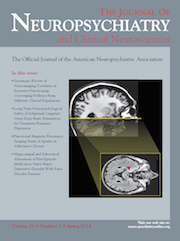Low-Dose Caffeine May Exacerbate Psychotic Symptoms in People With Schizophrenia
To the Editor: Caffeine is a commonly used psychoactive drug worldwide, and current data point out high intake of caffeine in some people with schizophrenia.1 The popularity of caffeine is due to its stimulant properties, which might cause mental and behavioral effects. Caffeine could alter dopamine transmission that is secondary to antagonism of adenosine receptors and has been reported to induce psychotic symptoms after large intake of caffeine (at least 10 mg/kg) in persons with2 and without3 schizophrenia. We report a case of worsening psychosis in a 49-year-old man with schizophrenia being treated with flupenthixol decanoate injections after consuming relative low dose of caffeine. The psychosis resolved after ceasing caffeine intake without changing antipsychotic medication.
Case Report
Mr. C is a 49-year-old married, jobless man with a history of chronic schizophrenia, paranoid type for more than 10 years. The patient had no history of drug abuse but smoked 20 cigarettes per day for more than 20 years. He was managed with flupenthixol decanoate injections by medical staff at the dose of 40 mg every 2 weeks. Prior to this presentation, the patient started to drink about four cans of coffee daily for 2 weeks and soon developed paranoia, delusion of reference, and agitation. Because of the potential homicidal risk, he was hospitalized, and his consumption of caffeine was halted. Surprisingly, without being prescribed new psychotropic agents, the patient’s symptoms improved gradually. Finally, he was discharged 50 days later and received regular follow-up appointments. He discontinued caffeine intake under the recommendation of the physician, and no apparent delusion or hallucination was noted thereafter.
Discussion
In contrast to previous case reports that describe the occurrence of psychosis after heavy ingestion of caffeine,2,3 we reported a case of psychosis consumed relative low dose of caffeine. The patient drank about four cups of coffee a day, and each contained 150 mg of caffeine per cup. The patient weighed 71 kg and, therefore, consumed less than 8.5 mg/kg/day of caffeine, which is slightly higher than average intake between schizophrenia smokers (4.1±4.0 mg/kg/day).4 The patient in our case received regular depot injections, therefore, poor adherence to medicine could be ruled out. No known drug-drug interaction was noted between caffeine and flupenthixol. Moreover, no any precipitating factor that could worsen psychotic symptoms was mentioned prior to this admission. Notably, the patient improved upon ceasing caffeine intake, and no apparent positive symptoms was present.
In humans, there are four types of adenosine receptors. Caffeine functions as a competitive antagonist at the adenosine A1 and A2A receptors and increases dopaminergic effects in the striatum.5 Through this mechanism, caffeine modulates the mesolimbic dopamine pathway that may be related to its psychotomimetic effect.1 Caffeine is widely used in our society, but little consideration has been given to its indirect effects on dopamine transmission leading to psychosis exacerbation. Prior case reports mentioned that high-dose caffeine can worsen psychotic symptoms in people with schizophrenia.2 Clinicians might consider the effect of caffeine consumption while evaluating psychotic patients, even though the consumption dose is low.
1 : Caffeine and schizophrenia. Psychiatr Serv 1998; 49:1415–1417Crossref, Medline, Google Scholar
2 : Psychosis following excessive ingestion of energy drinks in a patient with schizophrenia. Am J Psychiatry 2010; 167:353Crossref, Medline, Google Scholar
3 : Caffeine-induced psychosis. CNS Spectr 2009; 14:127–129Crossref, Medline, Google Scholar
4 : Fewer but heavier caffeine consumers in schizophrenia: a case-control study. Schizophr Res 2006; 86:276–283Crossref, Medline, Google Scholar
5 : Caffeine as a psychomotor stimulant: mechanism of action. Cell Mol Life Sci 2004; 61:857–872Crossref, Medline, Google Scholar



